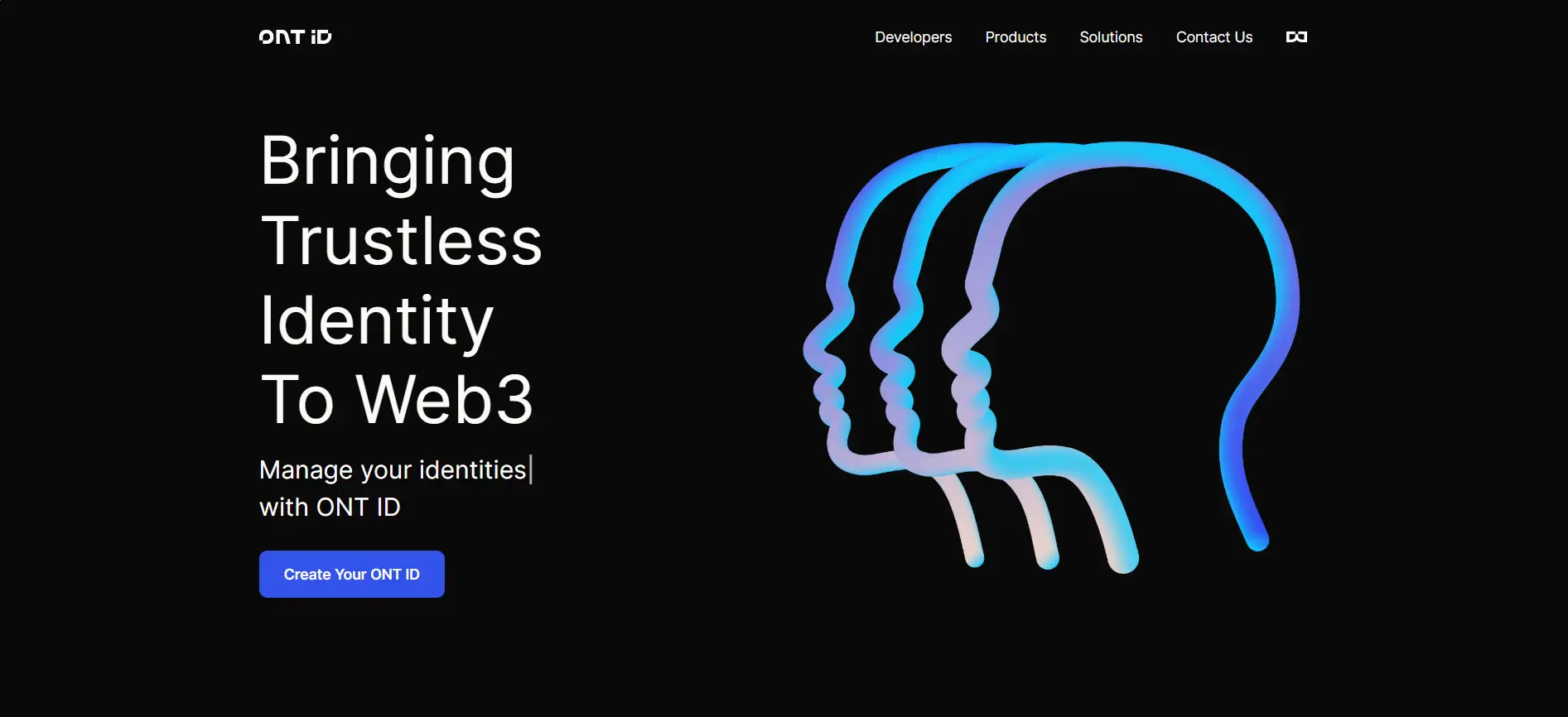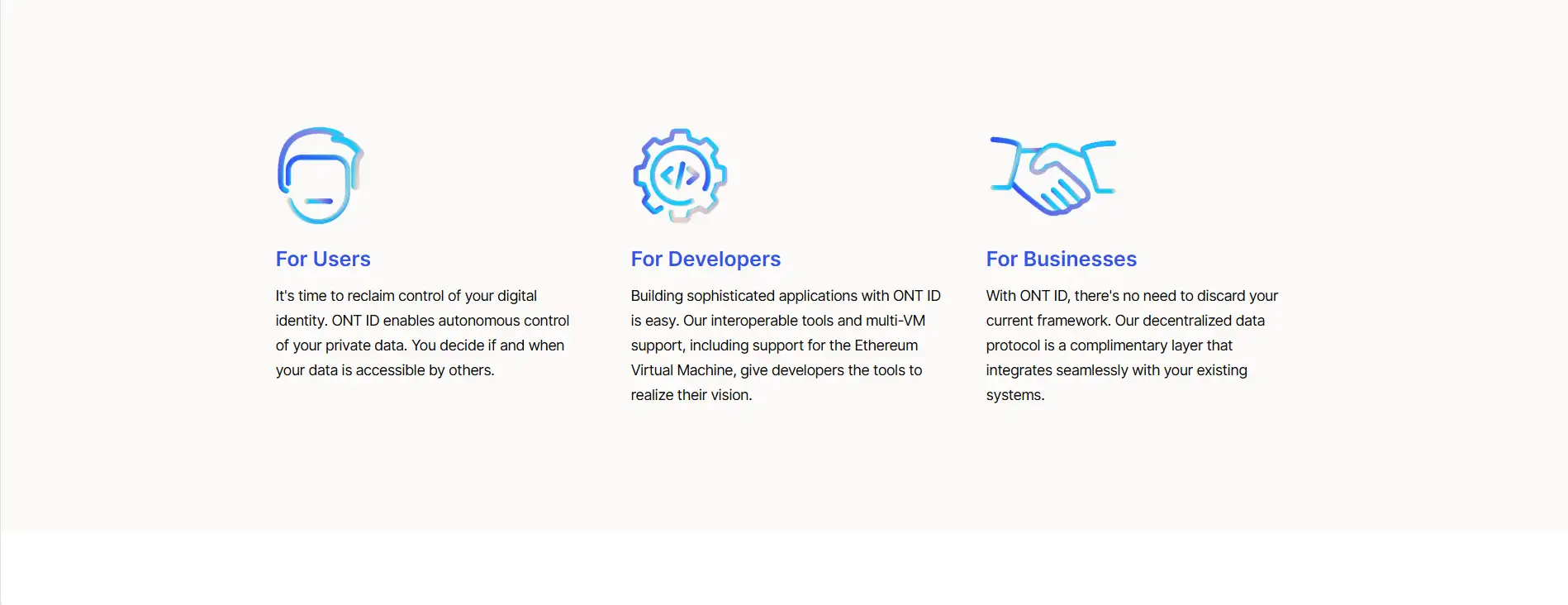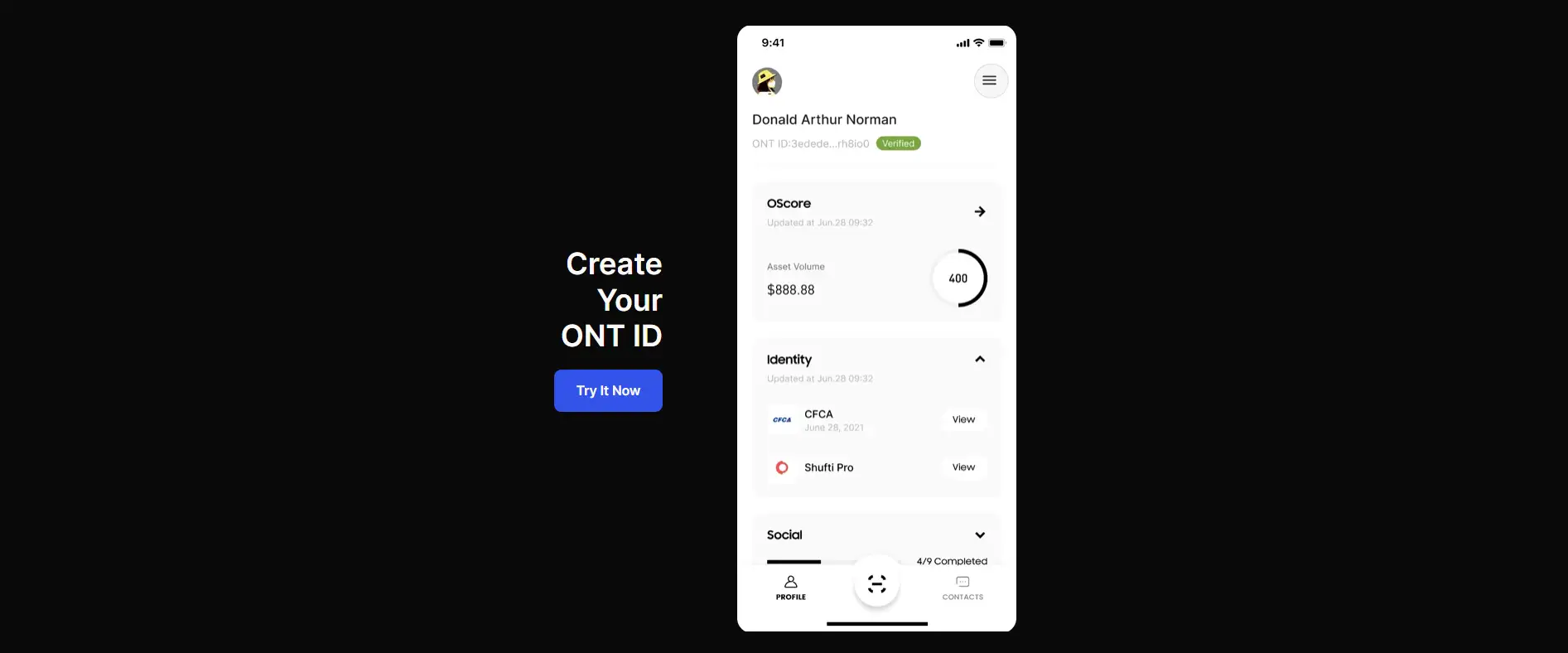About ONT ID
ONT ID is a robust, decentralized identity solution developed by Ontology, designed to bring trustless identity management to the Web3 ecosystem. Built on the principles recommended by the W3C for decentralized identifiers and verifiable credentials, ONT ID empowers users to manage and control their digital identities independently. The platform gives individuals and organizations the ability to protect personal data, make selective disclosures, and participate securely in the digital economy.
As an integral part of the Ontology ecosystem, ONT ID acts as a universal framework for identity across blockchains, supporting self-sovereign identity (SSI), data privacy, and verifiable credentials. Its applications span multiple domains—from decentralized finance to social authentication and business integrations. With support for Ethereum Virtual Machine (EVM), multi-language SDKs, and seamless compatibility with both Web2 and Web3 platforms, ONT ID stands out as a foundational layer in the emerging Web3 identity infrastructure.
ONT ID is part of the Ontology blockchain ecosystem and plays a central role in enabling secure, decentralized identity (DID) across both Web2 and Web3 environments. Designed as a trustless identity infrastructure, ONT ID empowers users to have complete control over their personal data, while offering businesses and developers an interoperable solution that adheres to global standards like the W3C decentralized identifier and verifiable credentials frameworks.
The ONT ID framework was created to address the rising concerns around user privacy, data misuse, and the limitations of centralized identity systems. Unlike conventional login and identity verification solutions that store sensitive user data on centralized servers, ONT ID leverages blockchain technology and public key cryptography to enable identity verification without ever exposing private data unless explicitly authorized. This user-centric approach ensures privacy preservation while maintaining high levels of usability and compliance.
One of ONT ID’s key components is its support for multi-language SDKs written in both Golang and Java, allowing developers to build on top of the system with ease. These SDKs are identifier-agnostic and conform to the W3C Verifiable Credentials Data Model, ensuring global compatibility and smooth integration across ecosystems. Developers can use these tools to create applications that incorporate decentralized login systems, KYC verification, and verifiable digital credentials without compromising performance or scalability.
From the user side, ONT ID offers full self-sovereign identity control, meaning individuals decide when and how their data is accessed. This makes ONT ID particularly useful for use cases such as decentralized finance (DeFi), blockchain-based credit scoring, and cross-platform identity verification. The platform supports verifiable login options including social media authentication through services like Twitter and Facebook, as well as advanced KYC tools through its Trust Anchor Gateway (TAG).
Businesses benefit by integrating ONT ID into their existing infrastructure without needing to completely rebuild their systems. ONT ID works as a complementary layer that enhances data privacy and user experience. Whether you are running a Web2 enterprise or a modern Web3 dApp, ONT ID offers plug-and-play solutions that reduce operational costs while increasing trust and transparency in user verification processes.
One of the most innovative tools built around ONT ID is OScore — a decentralized credit scoring system. It calculates creditworthiness based on on-chain behavior, such as wallet activity and asset holdings. This enables more responsible lending and borrowing in the DeFi space and allows platforms to reward users with better rates and privileges based on verified reputations.
Key competitors in the decentralized identity space include:
- Civic: Offers secure identity tools and reusable KYC services for blockchain apps.
- Shyft Network: Focused on building a trusted data exchange network for identity and compliance in DeFi.
Compared to these alternatives, ONT ID stands out for its seamless integration with the broader Ontology ecosystem, including the ONTO wallet, EVM compatibility, and ongoing commitment to global standards like W3C's DID/VC models. This makes ONT ID an enterprise-grade solution suitable for both Web3 innovators and traditional businesses looking to enhance user trust without compromising privacy.
ONT ID provides numerous benefits and features that make it a standout project in the decentralized identity ecosystem:
- Self-Sovereign Identity: Users gain full control over their identity and data, removing the reliance on centralized authorities.
- W3C-Compliant SDKs: The platform offers robust SDKs in Golang and Java that align with global standards, ensuring interoperability and security.
- Trust Anchor Gateway (TAG): Enables verifiable KYC and social authentication with low-cost and privacy-preserving mechanisms.
- EVM Compatibility: Developers can deploy ONT ID within Ethereum-compatible environments, expanding use case flexibility.
- Easy Integration: Easily integrates with both traditional applications and modern dApps, making it suitable for businesses and developers alike.
- Data Privacy: Users authorize when and what data is shared, ensuring strong privacy protections and consent-based data sharing.
ONT ID offers a smooth and intuitive way to start managing your digital identity securely:
- Visit the Website: Head over to the official ONT ID website to begin the process.
- Create Your ONT ID: Click the “Create Your ONT ID” button on the homepage to generate your identity credentials securely on the Ontology blockchain.
- Download Ontology Wallet: Use the ONTO wallet to manage your ONT ID and connect with other Ontology ecosystem services.
- Integrate TAG: Use the Trust Anchor Gateway for verifiable credential services like KYC, social logins, and private identity verification.
- Documentation: Review the developer documentation available through Ontology Docs to understand more advanced setup and usage scenarios.
ONT ID FAQ
ONT ID uses blockchain technology and public-key cryptography to allow users to verify their identity without ever exposing or storing personal data on centralized servers. By adhering to the W3C standards for decentralized identifiers (DIDs) and verifiable credentials (VCs), ONT ID enables secure, tamper-proof, and private interactions. Users remain in full control of their data and can selectively disclose information only when necessary.
Yes, ONT ID is built to be compatible with both Web2 and Web3 ecosystems. Businesses and developers can integrate ONT ID into their existing infrastructure using pre-built tools like the Trust Anchor Gateway (TAG) without requiring deep blockchain knowledge. ONT ID acts as a privacy-enhancing identity layer that is non-disruptive and easily connects to traditional systems via SDKs and APIs.
ONT ID serves as the foundational identity layer for OScore, Ontology’s decentralized credit scoring system. Using verifiable credentials tied to the user’s blockchain activity, ONT ID allows individuals to prove creditworthiness based on wallet history, DeFi interactions, and asset behavior. This enables a trustless, reputation-based system for crypto lending and borrowing—without sacrificing privacy or requiring traditional financial data.
Absolutely. ONT ID is designed to support use cases that require regulatory compliance such as KYC (Know Your Customer) and identity verification. Through the Ontology Trust Anchor Gateway (TAG), businesses can access verifiable credentials from globally recognized authentication providers. Integration with ONT ID enhances compliance processes while protecting user privacy, helping businesses meet both legal and ethical data standards.
ONT ID offers powerful, developer-friendly SDKs in Golang and Java that conform to W3C VC specifications. These SDKs are available on GitHub and include all the tools needed to issue, verify, and manage verifiable credentials. Developers can use these to create applications involving identity verification, selective data disclosure, and interoperable identity layers—all backed by the ONT ID framework.
You Might Also Like












